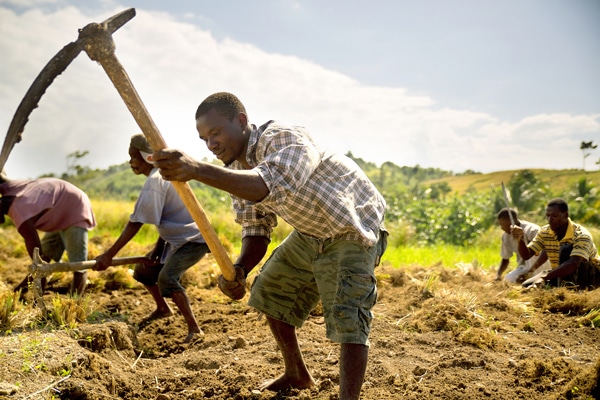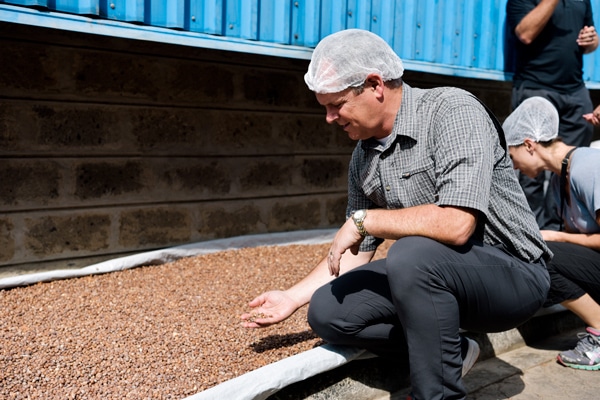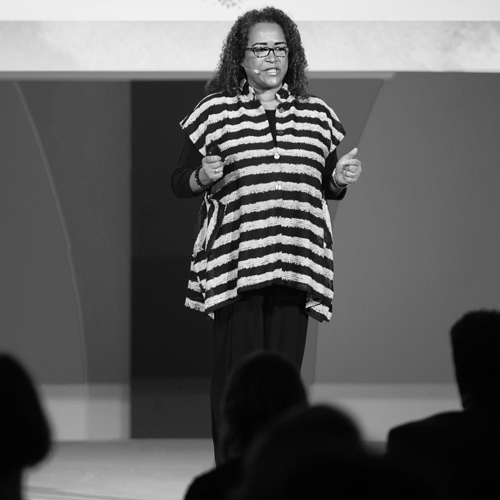In 2017, Corey Lindley traveled to the southeast tip of Kenya to visit a group of farmers. Lindley is the CFO of doTERRA, a producer and distributor of essential oils and oil-infused personal care and spa products, dietary supplements, and healthy living products for the home. The company recently built a several hundred-acre model farm in the region, where it is working with small-scale growers to harvest ginger, eucalyptus, tea tree, and other oils.
In Kenya, Lindley met a woman named Rebecca, who grows ginger on an acre of land. The company provides growers like Rebecca with seedlings and education about how to plant, weed, mulch, and manage their crops. “Working with the growers and being primary with them is absolutely key to allowing us to grow to the size that we have, continuing to provide pure, natural, essential oils,” he says.

Meetings such as this are indicative of doTERRA’s commitment to fostering close-knit relationships with its growers and producers around the world. For the first few years after its founding in 2008, doTERRA sourced its oils from trusted vendors, but consumer demand soon surpassed what vendors could supply. Although vendors told them there wasn’t enough oil to achieve their goal of becoming a $1 billion company, Lindley and his colleagues thought otherwise. “We believe that the earth has plenty to give if it’s managed well and we do our part,” Lindley says. “So we felt that it was incumbent upon us to get really connected with the growers.”
Now, doTERRA works directly with the majority of its growers to produce more than 130 essential oils, which it sources from more than forty-five countries. The company achieved its goal of growing to more than $1 billion in annual sales in the fall of 2015, and the growth remains exponential.
But growing the company was not doTERRA’s only goal. Leaders also wanted to positively impact the growers’ lives and create a self-sustaining system for the future. “The philosophy of being environmentally friendly and helping other people was part of the founders’ views and mission from the very beginning,” Lindley says. “However, it wasn’t until we began to get primary with growers that we were really able to make a difference in the growing and sustainability of oil.”
Through a practice doTERRA calls co-impact sourcing, the company partners with organizations and community leaders to create a system that benefits growers, harvesters, distillers, and the company.
DOTERRA BY THE NUMBERS
The number of countries doTERRA sources from: 40
The number of oils doTERRA sources:
130
The number of rural farming jobs co-impact sourcing will create in Kenya by 2020:
5000
As of September 2017, the total number of jobs doTERRA has created through co-impact sourcing:
20000
And this approach has paid off. For example, one of doTERRA’s top-selling oils is lavender, which it primarily sources from Bulgaria. When the company first entered Bulgaria, leaders learned that many of the farmers had stopped growing lavender because of inconsistent harvests and pricing. “Lavender is a crop where you don’t get a great yield in the first year,” Lindley says. “A lot of farmers are hesitant to commit to the future because prices go up and down.”
To gain farmers’ trust, doTERRA’s leaders promised demand. The company built a distillation facility in Bulgaria and guaranteed farmers consistent prices for five years. Then, the company developed a transparent distillation process: a farmer brings in their crop, watches as it is distilled and tested, and leaves with a check. “This brought huge confidence, and today we have farmers overflowing in Bulgaria,” Lindley says.
Ensuring fair payment is a key goal of co-impact sourcing. In Nepal, one of the company’s main crops is wintergreen, which grows natively on the hills. After visiting the farming communities in 2017, Lindley committed to giving the women who harvest the wintergreen raises each year. “In the three years that we’ve been there, the women that are harvesting the wintergreen now make double what they made before we started working with them, in terms of harvesting wintergreen,” he says.
Distilling essential oils like wintergreen requires a significant amount of heat, and generating that heat often involves burning limited resources such as coal and wood. In Nepal, doTERRA’s scientists determined that by crushing the wintergreen leaves and alternating short heating periods with longer rest periods that they could yield more oil with half the heat source.
And in Kenya, where doTERRA sources macadamia nut oil, distillers burn the nutshells as fuel, creating a self-sustaining system. “We’re always making sure that we’re not harming the environment where we go,” Lindley explains, “and that the plant sources will be able to continue to grow and maintain for decades to come.”
Another example of doTERRA’s co-impact sourcing is in Somalia, where farmers had overharvested many of the frankincense trees after a drought devastated the goat herds that brought in much of the community’s income. The company worked with environmental scientist Anjanette DeCarlo to determine which trees required a rest period before they were harvested again. During this rest period, doTERRA donated more than $1 million of foodstuffs to sustain the community, as well as donated resources to build a hospital. “Rather than just trying to take from these communities, we’re investing in them,” Lindley says.
Co-impact sourcing focuses on supporting growers, harvesters, and distillers overseas, but doTERRA is creating positive change in the lives of its US-based employees, as well. In 2016 and 2017, the company made Forbes’ America’s Best Midsize Employers list. As always, sustainable growth is doTERRA’s target. “We’re doing different things in a variety of ways to continue to help our employees move forward so they can be committed to us long-term,” he says.
For Lindley, it’s the company’s record-breaking commitment to giving back that makes it stand out. In partnership with the organization Days for Girls, which provides young girls in developing countries with education and supplies for feminine hygiene, doTERRA employees set a Guinness World Record for most personal hygiene kits assembled in one hour at the 2017 doTERRA Global Convention. “We’re associated with amazing people who care, and we provide a vehicle for them to give back,” Lindley says. “That is the center of our culture.”



